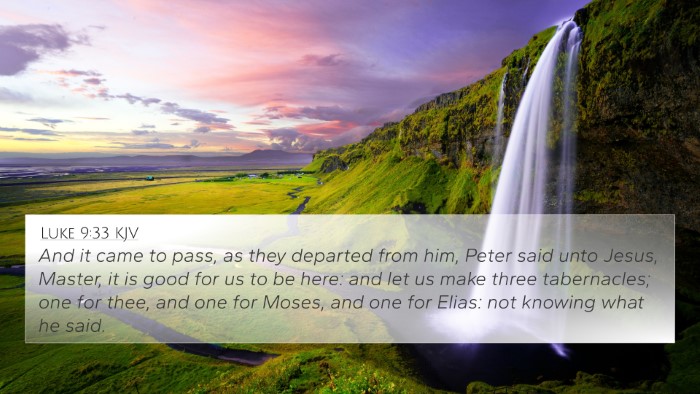Understanding Luke 5:5
Luke 5:5 states: "Simon answered and said to Him, 'Master, we have toiled all night and caught nothing; nevertheless, at Your word I will let down the net.'" This verse captures a significant moment in the Gospel of Luke where Simon Peter obeys Jesus' command despite his own experience and understanding. In this summary, we will explore the layers of meaning in this verse by combining insights from public domain commentaries, particularly those by Matthew Henry, Albert Barnes, and Adam Clarke.
Verse Context
To fully grasp the meaning of Luke 5:5, we must consider its context within the passage. Simon Peter, having labored in fishing unsuccessfully, receives a command from Jesus to cast his nets again. This moment showcases the tension between human effort and divine instruction.
Commentary Insights
Each of the commentators provides unique insights into this verse:
- Matthew Henry: Emphasizes the faith exhibited by Simon Peter in responding to Jesus' directive. Despite prior failures, Peter chooses to trust in the Lord's word, illustrating a key theme of obedience amidst doubt.
- Albert Barnes: Points out that Simon was skilled in fishing, and his initial reluctance demonstrates human wisdom clashing with divine guidance. Barnes notes that true faith often requires acting contrary to our own understanding or circumstances.
- Adam Clarke: Analyzes the significance of Peter's addressing Jesus as "Master," indicating a recognition of authority. Clarke further elaborates on the importance of submission to God's will, even when outcomes seem bleak.
Thematic Connections and Cross-References
Luke 5:5 is rich with thematic connections and serves as an example of the broader teachings found throughout the Bible. Here are some key cross-references that relate to this verse:
- Matthew 14:30-31: Peter walks on water but falters; Jesus rescues him, showcasing themes of faith and doubt.
- John 21:6: Another miraculous catch of fish highlights Peter's role as a fisher of men.
- Proverbs 3:5-6: Encourages trust in the Lord over one's understanding, aligning with Peter's decision.
- Isaiah 55:8-9: God's thoughts and ways are higher than ours, affirming the need for faith in divine command.
- Philippians 4:13: With Christ's strength, one can undertake the impossible, reflecting Peter's experience at Jesus' command.
- Romans 10:17: Faith comes by hearing the word of God; Peter acts based on Jesus' word.
- Jeremiah 17:7: Blessed is the man who trusts in the Lord, echoing the theme of reliance upon God seen in Peter's actions.
Practical Applications
This verse serves as a vital reminder for believers to trust in God's word, especially when circumstances suggest otherwise. Below are practical applications drawn from Luke 5:5:
- Trust in God's Timing: Recognize that there may be times of waiting and frustration, but obedience to God's call can lead to blessings.
- Step out in Faith: Like Peter, Christians are called to act on their faith, even when the outcomes are uncertain.
- Seek Guidance: Rely on God’s wisdom and guidance through prayer and scripture before making decisions.
- Learn from Failures: Understand that failures can be stepping stones to deeper faith and reliance on God.
Conclusion
Luke 5:5 encapsulates the essence of faith—trusting in God's command over our own understanding and experiences. Through the reflections of notable biblical commentators, we gain insight into the significance of obedience and the blessings that follow. As believers, we are invited to explore the connections between this verse and others, enriching our understanding of scripture as a cohesive and divinely orchestrated narrative.
Further Study and Tools
For those interested in deeper study on this verse and its connections, consider utilizing:
- Bible Concordances: Tools that help find verses that connect to themes or specific words.
- Cross-Reference Guides: Resources that outline related verses across both the Old and New Testaments.
- Bible Reference Resources: Comprehensive materials that assist in understanding and linking Bible scriptures.














